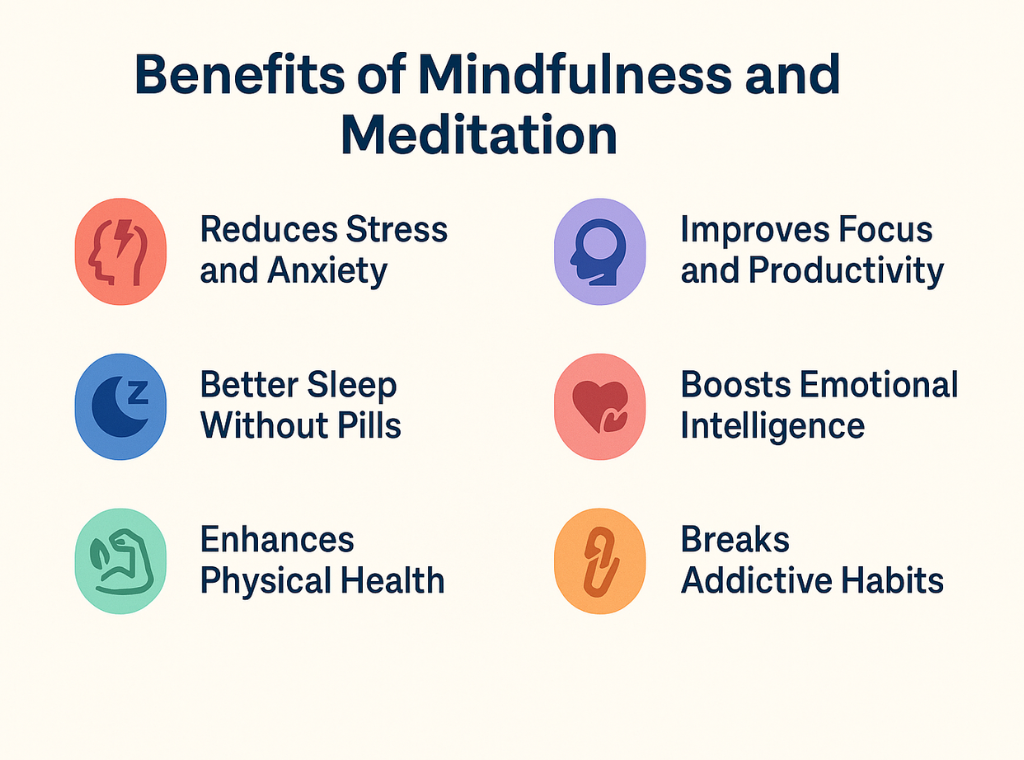Did you know that in 2024, over 60% of Indian professionals reported feeling mentally exhausted before lunch?
Yes, before lunch.
In cities like Bengaluru, Pune, and Mumbai, professionals are starting their day already tired—thanks to late-night screen time, morning traffic stress, and the relentless pressure to always be “on.”
We check our phones 96 times a day. We attend meetings back-to-back. We scroll mindlessly, hoping to feel better—but leave feeling worse.
Sleep is poor. Focus is fragmented. Peace is missing.
But here’s the twist—what if the solution doesn’t lie in doing more, but in pausing?
Thousands of Indians are quietly discovering a powerful tool to combat modern-day burnout: mindfulness and meditation. Not as a spiritual trend, but as a practical, 10-minute brain reset.
Want to know how a simple breath can change your entire day?
Keep reading. You’re closer to clarity than you think.
What Is Mindfulness and Meditation, Really?
At its essence, mindfulness means being fully aware of the present moment. You’re not stuck in yesterday’s regrets or overwhelmed by tomorrow’s worries—you’re right here, right now.
Meditation, on the other hand, is the practice that helps you cultivate this awareness. Whether it’s focusing on your breath, chanting, or guided sessions, it’s like daily exercise for your brain.
Unlike popular myths, it’s not mystical or out of reach. In fact, it’s being practiced by CEOs, recommended by therapists, and taught in top schools—because it works.
Why the Indian Middle Class Needs Mindfulness More Than Ever
Middle-class Indians are juggling more than ever—careers, kids, EMIs, and often elderly care. While we chase success, mental well-being takes a back seat.
Mindfulness doesn’t ask for dramatic changes in your lifestyle. Rather, it adds awareness to your existing routines, helping you function with clarity and calm
Benefits of Mindfulness and Meditation for Working Indians
1. Reduces Stress and Anxiety
Why it matters: Stress isn’t only emotional—it impacts your heart, digestion, immunity, and overall health.
How mindfulness helps: It strengthens your mind’s ability to stay steady, even during chaos.
✔ Science says: Just 10 minutes a day can lower your cortisol levels significantly.
2. Improves Focus and Productivity
Why it matters: If you’re re-reading the same paragraph five times, it’s not your workload—it’s your mental clarity.
How mindfulness helps: It boosts concentration and reduces mental fatigue.
✔ Try this: Start your day with 5 minutes of deep breathing—think of it as a mental warm-up.
3. Better Sleep Without Pills
Why it matters: Sleepless nights are common among overworked professionals.
How mindfulness helps: It quiets the racing thoughts, easing you into restful sleep.
✔ Helpful tools: Try Insight Timer or Headspace for sleep-specific guided meditations.
4. Boosts Emotional Intelligence
Why it matters: Snapping at loved ones after a tough day? Emotional intelligence helps you respond, not react.
How mindfulness helps: It builds self-awareness and empathy.
✔ Real talk: “I used to snap after work. Now, I pause and listen. It changed everything.” — Rohan, IT Professional
5. Enhances Physical Health
Why it matters: Mental strain often leads to physical illnesses like hypertension or diabetes.
How mindfulness helps: It lowers blood pressure, boosts immunity, and supports healing.
✔ Did you know? Many Indian doctors now prescribe meditation for chronic conditions.
6. Breaks Addictive Habits
Why it matters: Impulse behaviors like doomscrolling or stress-eating are tough to control.
How mindfulness helps: It creates a conscious pause between urge and action.
✔ Small wins: You begin to respond thoughtfully rather than react impulsively.
What Most People Get Wrong About Meditation
❌ “I can’t meditate because my mind won’t stop thinking.”
Actually, no one’s mind stops thinking. The goal isn’t to silence your thoughts. Instead, it’s to observe them without judgment. Each time you return your focus, your mental muscle strengthens.
❌ “I don’t have time.”
But you brush your teeth every day. You eat daily. Doesn’t your mind deserve just as much care?
FAQs: Mindfulness and Meditation
1. What is the best time to meditate?
Morning is ideal, but anytime you can do it consistently is perfect.
2. Can I do mindfulness without closing my eyes?
Yes! You can do walking, eating, or even working mindfully with eyes open.
3. How long should I meditate daily?
Start with 5–10 minutes. Gradually increase if you feel comfortable.
4. I get bored easily. What should I do?
Try guided meditations or switch up your practice with music or breathwork.
5. Do I need a meditation teacher?
Not necessarily. Apps and YouTube are enough for most beginners.
Let’s Get You Started
At The LifeTrackR, we believe life isn’t about doing more—it’s about being present for what truly matters.
Mindfulness and meditation don’t demand perfection; they invite practice.
Take your first breath today—and feel the difference tomorrow.
You’ve got this.
#Mindfulness #MeditationBenefits #MentalWellbeing #StressRelief #WorkLifeBalance #TheLifeTrackR
Editor’s Note: This article was originally published here https://thelifetrackr.com/the-life-changing-benefits-of-mindfulness-and-meditation-for-busy-indians/ by @Kairav and @krutika
